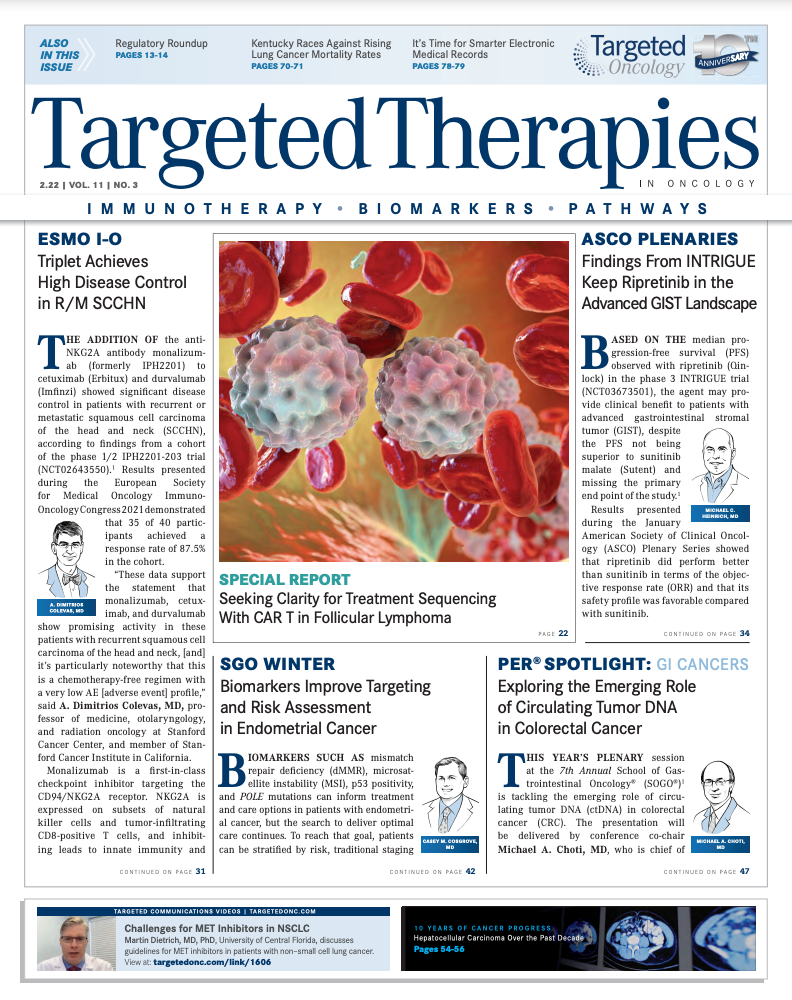Pembrolizumab/Chemotherapy Combo Shows Positive Responses in Neoadjuvant Setting of ESCC
Neoadjuvant treatment with pembrolizumab, paclitaxel, and cisplatin achieved encouraging tumor responses in patients with locally advanced resectable esophageal squamous cell carcinoma.

In the neoadjuvant setting, the combination of pembrolizumab (Key- truda), paclitaxel, and cisplatin demonstrated responses and safety in an interim analysis of the phase 2 KEYSTONE-001 trial (NCT04389177), which evaluated patients with locally advanced resectable esophageal squamous cell carcinoma (ESCC).1 Findings were presented during a virtual presentation at the European Society of Medical Oncology Immuno-Oncology Congress 2021 by lead author Xiaobin Shang, MD, an attending sur- geon in the Department of Minimally Invasive Esophageal Surgery at Tianjin Medical University Cancer Institute & Hospital in China.1
Tumor responses were encouraging, with the pathologic complete response (pCR) reported as 41.4% in 12/29 patients with stage T0N0 disease and 58.6% (17/29) in patients with ypT0 (absence of invasive cancer in breast and axillary nodes). The PR for neoadjuvant measures was 72.4% of patients (21/29).1 Regarding T stage, 58.6% of patients were ypT0, 17.2% were ypT1, 13.8% were ypT2, and 10.4% were ypT3. Similarly, for N stage, 62.1% of patients were ypN0, 20.7% were ypN1, 13.8% were ypN2, and 3.4% were ypN3.
The standard of care consists of neoadjuvant chemoradiotherapy with surgery for locally advanced disease. However, patients often refuse or abandon radiotherapy because of adverse events (AEs).2 The inves- tigators sought to determine the efficacy of pembrolizumab administered in the neoadjuvant setting prior to surgery.
Patients were eligible to enroll if they had stage III disease, no previous history of treatments, and had an ECOG performance status of 0 to 1. Fifty patients were randomized to receive intravenous pembrolizumab (500 mg on day 1), paclitaxel (135 mg/m2 on day 2), and cisplatin (20 mg/m2 on days 2 to 4). Treatment was delivered every 3 weeks over the course of 3 cycles. After 4 to 6 weeks, patients underwent robotic-assisted McKeown surgery. The investigators said patients with pCR were observed and received follow-up, whereas patients with non-pCR received pembrolizumab as single-agent maintenance for at least 6 cycles. The primary end points were major pathologic response rate and safety, and secondary end points were pCR, objective response rate, and quality-of-life assessment.
At this interim analysis, 42 patients were enrolled, of which 29 completed surgery and were evaluated. At baseline, patients were a median age of 61 years (range, 46-70), the majority (93.1%) were men, and 93.1% had an ECOG performance status of 1. Investigators said all patients completed the prescribed 3 cycles of pembrolizumab and chemotherapy without treatment interruption or disruption. The median time from the first dose of pembrolizumab to surgery was 79 days (interquartile range, 75-83).
Regarding safety, no AEs of grade 3 or higher that were related to neoadjuvant treatment occurred. The most common AEs related to neoadjuvant treatment were rash or pruritus (62.1%), leukopenia (51.7%), dry skin (44.8%), and xerostomia (34.5%). The total incidence of surgery-related AEs was 17.2% and included infectious pneumonia (6.9%) and anastomotic leakage (10.4%).
To determine health-related quality of life, patients completed 2 questionnaires: the European Organization for Research and Treatment Quality of Life Questionnaires Core30 (QLQ-Q30) and the QLQ-Oesophagus 18 (QLQ-OES18). Findings from the QLQ-C30 questionnaire suggested that patients who underwent neoadjuvant therapy had a lower risk of deterioration in both function and symptoms. The QLQ-OES18 questionnaire suggested that neoadjuvant therapy was associated with a lower risk of worsening of 10 symptoms, including choking, coughing, dry mouth, trouble swallowing, and eating.
These findings are encouraging, and the investigators reported that KEYSTONE-002 (NCT04807673), evaluating pembrolizumab combined with chemotherapy vs concurrent chemoradiotherapy in the neoadjuvant setting in locally advanced ESCC, is ongoing.
REFERENCES:
1. Shang X, Zhang C, Zhao G, et al. Safety and efficacy of pembroli- zumab combined with paclitaxel and cisplatin as a neoadjuvant treat- ment for locally advanced resectable (stage iii) esophageal squamous cell carcinoma (Keystone-001): interim analysis of a prospective, sin- gle-arm, single-center, phase II trial. Ann Oncol. 2021;32(suppl_7): S1428-S1457. doi:10.1016/annonc/annonc787
2. Ando N, Kato H, Igaki H, et al. A randomized trial comparing post- operative adjuvant chemotherapy with cisplatin and 5-fluorouracil ver- sus preoperative chemotherapy for localized advanced squamous cell carcinoma of the thoracic esophagus (JCOG9907). Ann Surg Oncol. 2012;19(1):68-74. doi:10.1245/s10434-011-2049-9
